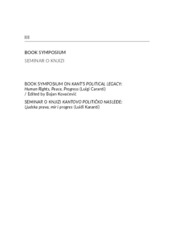| dc.creator | Kovačević, Bojan | |
| dc.date.accessioned | 2019-06-13T11:35:20Z | |
| dc.date.available | 2019-06-13T11:35:20Z | |
| dc.date.issued | 2018 | |
| dc.identifier.uri | http://rifdt.instifdt.bg.ac.rs/123456789/1972 | |
| dc.description.abstract | The main idea behind this article is that in order to understand the
meaning that Kant’s political philosophy is rendered to by the given
socio-historical context of a community we need to turn for help to
artistic genius whose subjective “I” holds a general feeling of the world
and life. It is in this sense that authors of great novels can help us in two
ways. First, their works summarise for our imagination artistic truth about
man’s capacity for humanity, the very thing that Kant considers to be
the scientifically improvable “fact of reason”. Second, works of great
writers offer for our insight destinies of individuals who decide to pursue
moral dictate in a society, thus actualising the potential that lies hidden
in all of us, making us worthy of respect. As we lack objective scientific
standard of measurement, artist’s universal feeling of the world is impressed
upon us through a narrative about a man who, in a given society and in
a given moment, decides to exercise his autonomy and seek the divine
in himself. Contemporary social scientists’ attempts to prove historical
progress is characterised by the very lack of humbleness. Referring to
the great novelists’ works in this article is aimed to remind scientists of
restraint and self-control demanded from them by the citizen of Konigsberg. | en |
| dc.description.abstract | Osnovna teza članka jeste da bi za razumevanje smisla koji Kantova politička filozofija zadobija u konkretnom društveno-istorijskom kontekstu određene zajednice trebalo iskoristiti pomoć genijalnih umetnika u čijem se subjektivnom „ja“ smestilo opšte osećanje sveta i života U tom smislu, pisci velikih romana mogu nam pomoći na dva načina. Prvo, njihova dela sažimaju za našu uobrazilju umetničku istinu o čovekovom kapacitetu za ljudskost, onome što za Kanta predstavlja naučno nedokazivu „činjenicu razuma“. Drugo, u delima velikih pisaca možemo posmatrati sudbinu pojedinaca koji u određenom društvu odluče da deluju u skladu sa moralnim zakonom, ostvarivši tako mogućnost koja leži u svakome od nas i čini nas vrednim poštovanja. U odsustvu objektivnih naučnih merila, umetničko opšte osećanje sveta prenosi nam se kroz priču o čoveku koji u konkretnoj zajednici u određenom vremenu odluči da ostvari svoju autonomiju, potraži božansko u sebi. Odsustvo skromnosti ono je što odlikuje pokušaje današnjih društvenih naučnika da dokažu istorijski progres. Pozivanje na dela pisaca velikih romana u ovom članku o Kantu ima za cilj da opomene naučnike na uzdržanost i samograničavanje koje je od njih zahtevao građanin Kenigsberga. | sr |
| dc.language.iso | en | sr |
| dc.publisher | Beograd : Institut za filozofiju i društvenu teoriju | sr |
| dc.rights | openAccess | sr |
| dc.rights.uri | https://creativecommons.org/licenses/by-nc-nd/4.0/ | |
| dc.source | Filozofija i društvo/Philosophy and Society | sr |
| dc.subject | Kant | sr |
| dc.subject | novel | sr |
| dc.subject | freedom | sr |
| dc.subject | peace | sr |
| dc.subject | Tolstoy | sr |
| dc.title | Subjective Universality of Great Novelists as an Artistic Measure of History’s Advance towards Actualising Kant’s Vision of Freedom | en |
| dc.type | article | sr |
| dc.rights.license | BY-NC-ND | sr |
| dcterms.abstract | Ковачевић, Бојан; | |
| dc.citation.issue | 4 | |
| dc.citation.volume | 29 | |
| dc.citation.spage | 567 | |
| dc.citation.epage | 585 | |
| dc.type.version | publishedVersion | sr |
| dc.identifier.fulltext | http://rifdt.instifdt.bg.ac.rs/bitstream/id/4578/bitstream_4578.pdf | |
| dc.identifier.rcub | https://hdl.handle.net/21.15107/rcub_rifdt_1972 | |

